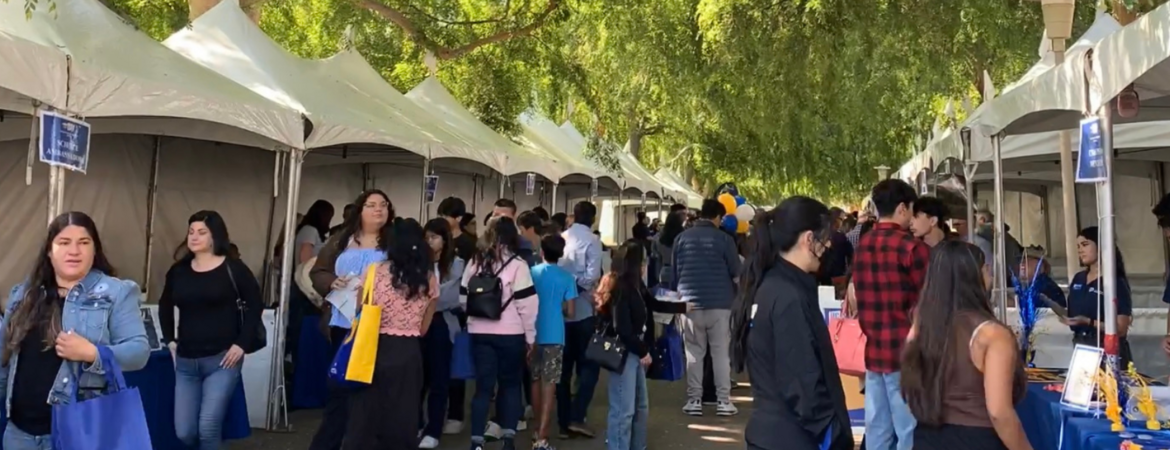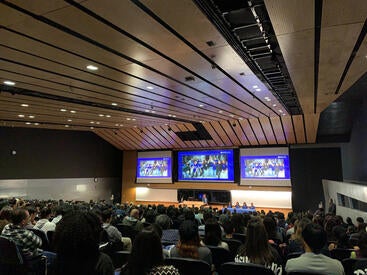
On April 15, admitted first-year students and their families converged onto the University of California, Riverside (UCR) campus for Highlander Day – an all-day open house held annually to showcase the richly diverse and inclusive array of opportunities available at UCR.
Highlander Day also gives students admitted to UCR’s College of Natural & Agricultural Sciences (CNAS) a detailed look at the exciting future that awaits them by helping them to explore new opportunities and think about the academic paths they might pursue. Admitted students learned about CNAS’ core areas, what makes the college unique, and how to get involved in research projects.
The day kicked off with a “CNAS Information Session,” an in-depth look at the college’s mission, goals, and resources. After welcome remarks by CNAS Dean Kathryn Uhrich, Connie Nugent, Divisional Dean of Student Academic Affairs, gave a presentation on CNAS followed by a current student panel, where panelists shared their experiences inside and outside of the classroom and took questions from an eager audience.
Concurrent CNAS campus tours, led by the CNAS Science Ambassadors, were also offered throughout the day. According to Jennalyn Resendez, CNAS Science Ambassador and Vice President of Tours, the primary goal of the tours is to provide admitted students with an opportunity to discover all that CNAS has to offer through the unique perspective of their tour guides.
“[Admitted students] receive honest and worthwhile advice not just for college, but tips for navigating through life as well,” said Resendez, who is a Cell, Molecular, and Developmental Biology major. “Ultimately, I want to help students feel welcomed, provide them with a sense of belonging here at UCR, and encourage them to make Riverside their home for the next four years.”
“We do our best to cover everything from the lower division curriculum to academic support and research opportunities,” said Science Ambassador Jorg Galang, Co-President of the CNAS Science Ambassadors and a 4th year Neuroscience major. “We want to ensure that incoming students are fully aware of what CNAS has to offer before they come to UCR, because we want to make the transition to university life as smooth as possible.”
During the “CNAS: Meet the Faculty” session, Stefano Vidussi, Divisional Dean of Physical Sciences and Mathematics, shared that a major hallmark of the UCR experience goes beyond grades.
“Student success is more intrinsic than [grades],” said Vidussi. “You can find a biology, math, or chemistry major at every campus in the United States, but when I talk about student success measures with faculty from other universities, they don’t have nearly the same level of commitment to student success as we do at CNAS.
Vidussi added that at CNAS, “Every faculty member learns from day one that our goals are doing research, writing papers, and participating in conferences, but also maximizing student success. It goes beyond classroom instruction…we enable successful student outcomes via early research in undergraduate labs. This is a culture unique to UCR that you won’t find in other biology, math, or chemistry departments across the U.S.”
A foundational tenet at UCR is undergraduate research and lab work. “We are a R1 research institution which conducts a high level of research activity,” said Dean Uhrich. “Many students don’t realize that they can do research early on, but I’m always looking for first- and second-year students because I want them in my lab for a few years.”
Katherine Borkovich, CNAS Divisional Dean of Life Science, said signing up for research projects can be daunting as a new student. “The first few quarters at UCR, you’ll be transitioning to life on campus,” she said. “But after that, if there’s a professor whose class you took, or if there’s a faculty member whose research interests you, go for it! We always encourage students to start making connections.
“The other advice I always give students is to look into summer research programs early,” she continued. “At UCR, we have summer research opportunities, many of which are funded by the National Science Foundation. It will be a good experience to do research during the summer.”
Another standout feature of Highlander Day was the College Fair, which featured booths dedicated to the CNAS Peer Mentors, Science Ambassadors, Learning Communities, and academic majors. All of the booths were staffed by CNAS faculty, advisors, and students, who chatted with admitted students and their families about life at UCR.
“The Learning Communities are very structured and focused on connecting students with classmates, faculty, and resources from day one,” said Brett McFarlane, CNAS Director of Undergraduate Advising. “[Students] take their core science classes together for an entire year. When I talk to graduating seniors at commencement, the one thing they say is, ‘I met my best friends in my Learning Community.’”
McFarlane continued, “Those relationships get developed early…you then have a support network that carries you through your college career because you are in the same courses with fellow students and faculty who support you. Being able to support and find a peer network is absolutely important, and it’s not happenstance. Campuses and colleges have to structure these peer networks…we are one the few¬ campuses that put a lot of effort into structuring that environment.”
Developing support networks via CNAS’ Learning Communities and fostering close contact with professors factors into student success and enables students to graduate on time said Isgouhi Kaloshian, CNAS Divisional Dean of Agriculture and Natural Resources.
“At UCR, students have ample access to their faculty,” she said. “We encourage students to go to office hours. No matter how big your class size is, you have direct access to the professor.”
Dean Nugent summed up what Highlander Day embodies by highlighting all of the benefits to be gained enrolling at the college.
“I hope,” she said, “that visitors to campus learn that students at UCR and CNAS are welcomed into a caring community of scholars that supports them with quality education, resources, and accessible opportunities.”
##
